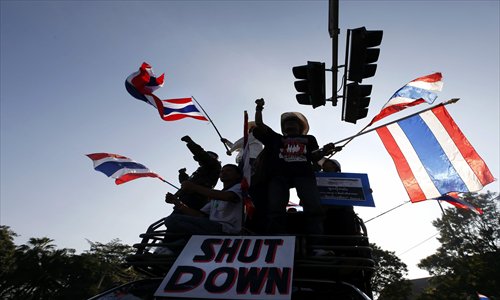Bangkok in deadlock

Thai anti-government protesters wave national flags during the Bangkok Shutdown rally outside the Customs Department in Bangkok, on January 14 2014. Photo: CFP
"Reform first, then election," a Thai opposition leader addressed anti-government protesters on the main streets and street corners of Bangkok during the shutdown movement on January 13, in an attempt to force Prime Minister Yingluck Shinawatra to step down.
Bangkok has been "shut down" for one week since huge crowds of Thai opposition protesters, usually known as "Yellow Shirts," occupied major streets of the city on January 13.
"Our goal is to totally wipe out the influence of the Thaksin regime," a spokesman for the opposition told the Global Times, adding that the Bangkok Shutdown movement wouldn't stop until Yingluck steps down.
Thailand's fugitive former prime minister Thaksin Shinawatra, Yingluck's elder brother, was ousted by royalist generals in 2006 under pressure from huge anti-Thaksin demonstrations by the Yellow Shirts.
Although Thaksin has been exiled, the billionaire tycoon-turned-politician still has strong support in large rural areas in northern Thailand, yet he is reviled by many southerners, Bangkok's middle class and members of the royalist establishment.
The deadlock in Bangkok shows no sign of easing as Yingluck has firmly refused the opposition's request to step down and vowed to stick to plans for a February election.
The security chief said Monday that the Thai government is "very seriously" considering a state of emergency after 28 people were injured in a grenade attack on a rally in central Bangkok.
Disparity
"The protest broke out as a result of the confrontation between different interests of the elite middle class in Thailand and Thaksin's rural supporters," Zhuang Guotu, director of the Center for Southeast Asian Studies at Xiamen University, told the Global Times.
As with most developing countries, the gap between rich and poor in Thailand is wide, which has led to disagreement between the lower and middle classes. According to data from the World Bank, the Gini coefficient in Thailand was 42.8 in 2000 and in 2010 the figure in the country still stood at 40.02. An index above 40 means that the income disparity in a country is "serious."
Since he took office in 2001, Thaksin has taken effective measures to reduce rural poverty, introduce universal healthcare and initiate programs like village-managed microcredit development funds, low-interest agricultural loans and direct injections of cash into village development funds.
According to the National Economic and Social Development Board of Thailand, which is under the Prime Minister's Office, income in the northeast - the poorest part of the country - rose by 46 percent from 2001 to 2006 and the World Bank data showed that nationwide poverty fell from 21.3 percent in 2000 to 11.3 percent in 2004.
These policies helped Thaksin to win vast support from the rural poor in Thailand, especially in the populous northeast.
However, Thaksin's measures aroused dissatisfaction in the middle class and royalist establishment as he was accused of corruption, tax evasion and selling Thai assets to international investors.
The opposition, backed by the royalist establishment, launched protests in 2006 and the military later overthrew Thaksin's government in a coup when he was overseas.
Bi Shihong, a professor with the School of International Studies at Yunnan University, told the Global Times that Yingluck was widely popular when she was elected in 2011, but as Thaksin's sister, she unavoidably inherited her brother's polices which were strongly opposed by opposition protesters.
Three powers
Zhuang notes that there are three political powers existing in Thailand, following the patterns of recent unrest in the country.
Besides the elite middle class who form the anti-Thaksin regime and Thaksin's rural supporters, the military loyal to King Bhumibol Adulyadej plays the role of "arbitrator" in the restive country, said Zhuang, adding that the influence of the King in Thailand is "very powerful," a special phenomenon among constitutional monarchies.
"People here respect the King very much and most of them are not willing to discuss the King with me as it seems improper," Zhang Qian, a Chinese volunteer teacher in Bangkok, told the Global Times. Zhuang said that the military is totally loyal to the 86-year-old king and his words exert massive influence on Thailand's politics.
Before the Bangkok Shutdown, the opposition called the military to aid them and rumors of a coup were rife. The military, which has staged or attempted 18 coups in 81 years of on-off democracy, has tried to stay neutral this time and army chief Prayuth Chan-ocha has publicly refused to take sides.
Bi said the military is still observing the deadlock and it's hard to predict whether it will launch a coup.
"The military will bear great international pressure and a damaged reputation as it already launched a coup in 2006," said Zhuang.
However, Bi noted that the government always stays in a relatively weak position when confronting the military, which is a huge flaw in the country's democracy system and has hindered the process of Thailand's democracy.
Agencies contributed to this story